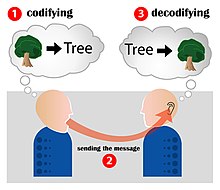
Discourse analysis (DA), or discourse studies, is a general term for a number of approaches to analyzing written, vocal, or sign language use or any significant semiotic event.
The objects of discourse analysis—discourse, writing, conversation, communicative event—are variously defined in terms of coherent sequences of sentences, propositions, speech acts, or turns-at-talk. Contrary to much of traditional linguistics, discourse analysts not only study language use 'beyond the sentence boundary', but also prefer to analyze 'naturally occurring' language use, and not invented examples. Tex...